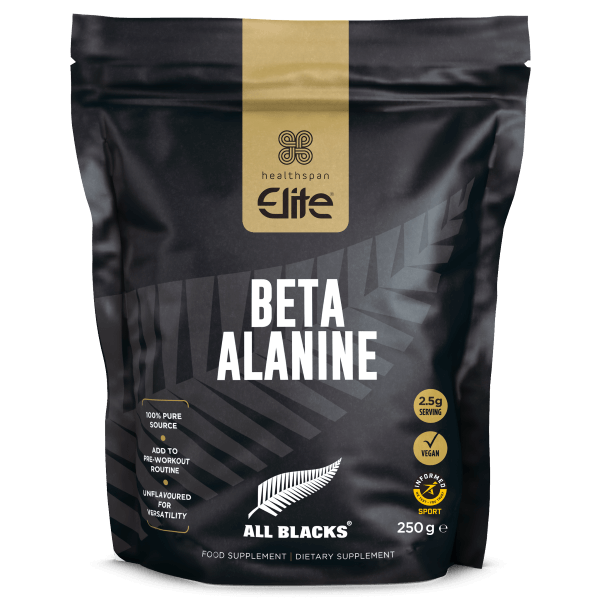Wendy Martinson OBE, Registered Dietitian and Performance Nutritionist, explains how beta-alanine can be used in sport, what effects it has on the body, safety and side effects and why nutritionists may want to include it in their plans.
We all know that familiar uncomfortable feeling of fatigue and intense heat building in the muscles when we exercise hard at high intensities, such as during the final sprint of a race or during an interval training session.
One of the main contributors to this feeling of fire in the muscles is the increase in acidity that occurs when the lactic acid produced disassociates to lactate and H+ ions during high-intensity exercise.
Fortunately, the body has an inbuilt buffering system to deal with this change in pH, which includes intracellular carnosine (inside the cell) and extracellular bicarbonate (outside the cell). Muscle buffering describes your body's ability to neutralise the H+ ions that build up in your muscles during hard exercise.
"We use beta-alanine as part of our performance nutrition strategy to aid training capacity and improve repeated sprint performance."
Alek Gross, Head of Sports Science, Southampton FC
Can the buffering capacity of the muscles be improved?
What if the buffering capacity of the muscles could be improved, delaying muscle fatigue and bringing the potential to improve exercise performance?
Bicarbonate supplementation has been extensively researched and used for many years in sport to assist buffering, but for some can have unwelcome gut side effects, which can limit its use.
However, increasing carnosine levels in the muscles through supplementation with beta alanine is another option, and has a good evidence base with limited side effects. Carnosine helps to delay the accumulation of H+ ions during intense exercise.
Carnosine as a buffer
Carnosine accounts for ~ 8%1 of the muscles' ability to buffer the acidity (H+ ions) produced by high-intensity exercise, but this could reach 15% if enhanced via beta-alanine supplementation.
Beta-alanine is believed to be the limiting factor in carnosine production and is an amino acid which, when combined with L-histidine, produces the dipeptide carnosine (beta-alanyl-L-histidine).
Beta-alanine is found in dietary sources such as meat, poultry and fish, and so vegetarians have a lower muscle carnosine level than meat eaters.
Significantly increasing carnosine levels through dietary sources of beta-alanine is difficult, and so supplementation is the most effective strategy.
Find out more about beta-alanine

Beta-alanine: practical benefits for athletes
Nigel Mitchell, Performance Nutritionist, provides an overview of beta-alanine, explaining the extensive use of the supplement and its practical application at Olympic and professional level.
Find out more
Beta-alanine supplementation – how does it work?
Research has demonstrated that supplementing with beta-alanine over time can increase muscle carnosine levels and therefore enhance intramuscular H+ buffering.
Supplementation may improve performance by 0.2-3% of both continuous and intermittent exercise lasting 30s to 10 minutes2, 3 that includes repeated bouts of high-intensity work (sprints, lifts), which cause an exercise-limiting increase in H+ ions over time. There may also be a modest benefit for exercise lasting up to 25 minutes.
It may also enhance training adaptations, by allowing appropriate intervals to be conducted at a higher intensity.
Supplementation may increase total work done and power output, and decrease feelings of fatigue and perceived exertion.

Elite All Blacks Beta Alanine
100% pure source of beta-alanine to supplement your pre-workout routine
- Pure, unflavoured source of the amino acid beta-alanine
- Plays a vital role in the production of carnosine, which buffers lactic acid
- Suitable for plant-based diets
What's an effective dosing strategy?
If beta-alanine is supplemented at levels of 4-6g/day (~ 65mg/kg), muscle carnosine has been found to increase by 64% after 4 weeks and by 80% after 10 weeks.4 Most research protocols range from 4-12 weeks in duration, with just one study of 24 weeks showing a further increase, although this varied between individuals.5
It is unclear how long supplementation needs to be continued to maximise muscle carnosine levels, and no upper limit for muscle carnosine levels have yet been established. There may also be a variation in the response to supplementation, and so some people may have a more marked increase in muscle carnosine levels than others. This may be partly related to baseline muscle carnosine content and muscle fibre composition.
Once supplementation is stopped, it may take 6 weeks in low responders for carnosine levels to fall to baseline, and 15 weeks in high responders.2
What's an example supplement strategy leading into competition?
For a 75kg athlete taking part in an event lasting 30s-10m, a 5g dose (~65mg/kg) could be taken for 4-12 weeks leading into competition. Supplementation should be taken with a carbohydrate-containing food or drink to enhance muscle uptake, and the dose split throughout the day and taken every 3-4 hours. For example, for a total 5g dose a split of 2x 1.5g plus 2x 1g every 3-4 hours would be appropriate.
Safety and side effects
The main side effect described is paraesthesia, which is a prickling or 'pins and needles' sensation, which lasts for about 60-90 minutes and occurs approximately 10-20 minutes after a dose of beta-alanine is taken. It typically occurs in the face, neck and back of hands.
It is thought that beta-alanine activates specific receptors in the skin to cause this effect, but to date there is no evidence that this is harmful.4 It is advisable to take beta-alanine in split doses throughout the day to help limit this side effect. Taking it with carbohydrate foods can also help limit side effects as well as enhancing muscle uptake.
To date no studies have evaluated the effects of long-term beta-alanine supplementation (more than 1 year) or whether there may be interference with adaptation if used long term. For this reason, it seems sensible not to use it continuously but to focus its use for short blocks of 4-12 weeks at key points in the year leading into competition or for specific training periods.







